Sociological Perspectives on Nigeria's International Positionality
VerifiedAdded on 2023/01/10
|11
|2825
|53
Report
AI Summary
This report provides a critical sociological analysis of Nigeria's positionality within the international context, examining the country's political, economic, and social landscape. It delves into the challenges faced by Nigeria, including governance issues, the impacts of globalization, and the effects of political crises on socio-economic development. The analysis explores various theoretical lenses, such as individual deficiency theory and theories of African politics, to understand the complexities of poverty, corruption, and clientelism. The report highlights the significance of Nigeria's internal dynamics, including the roles of the National Assembly and domestic forces, in shaping its position. Furthermore, it discusses the impact of political and social crises on the state's development, emphasizing the need for perceptive policy perspectives. The report draws on the themes of the course, providing a comprehensive overview of Nigeria's positionality and the factors influencing its trajectory.
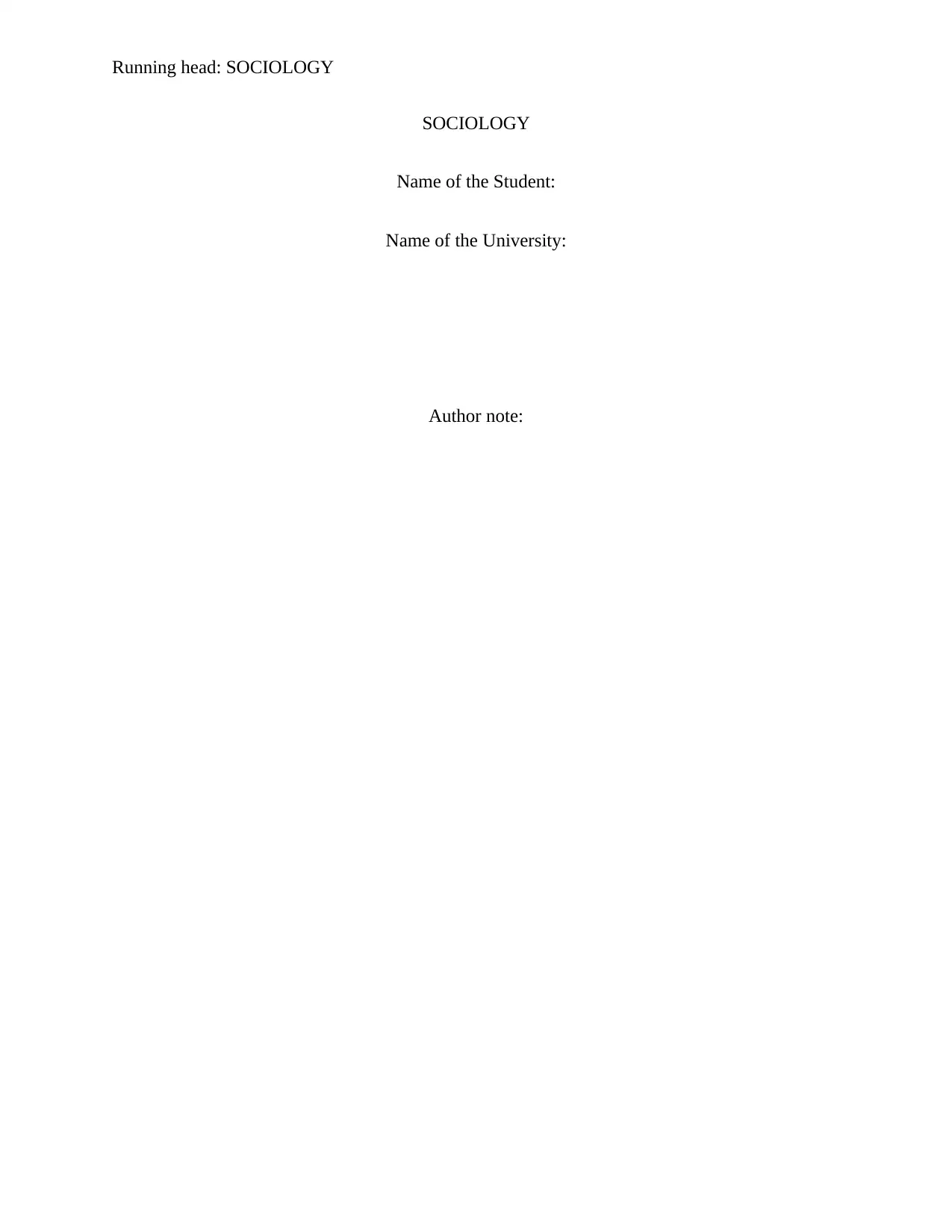
Running head: SOCIOLOGY
SOCIOLOGY
Name of the Student:
Name of the University:
Author note:
SOCIOLOGY
Name of the Student:
Name of the University:
Author note:
Paraphrase This Document
Need a fresh take? Get an instant paraphrase of this document with our AI Paraphraser
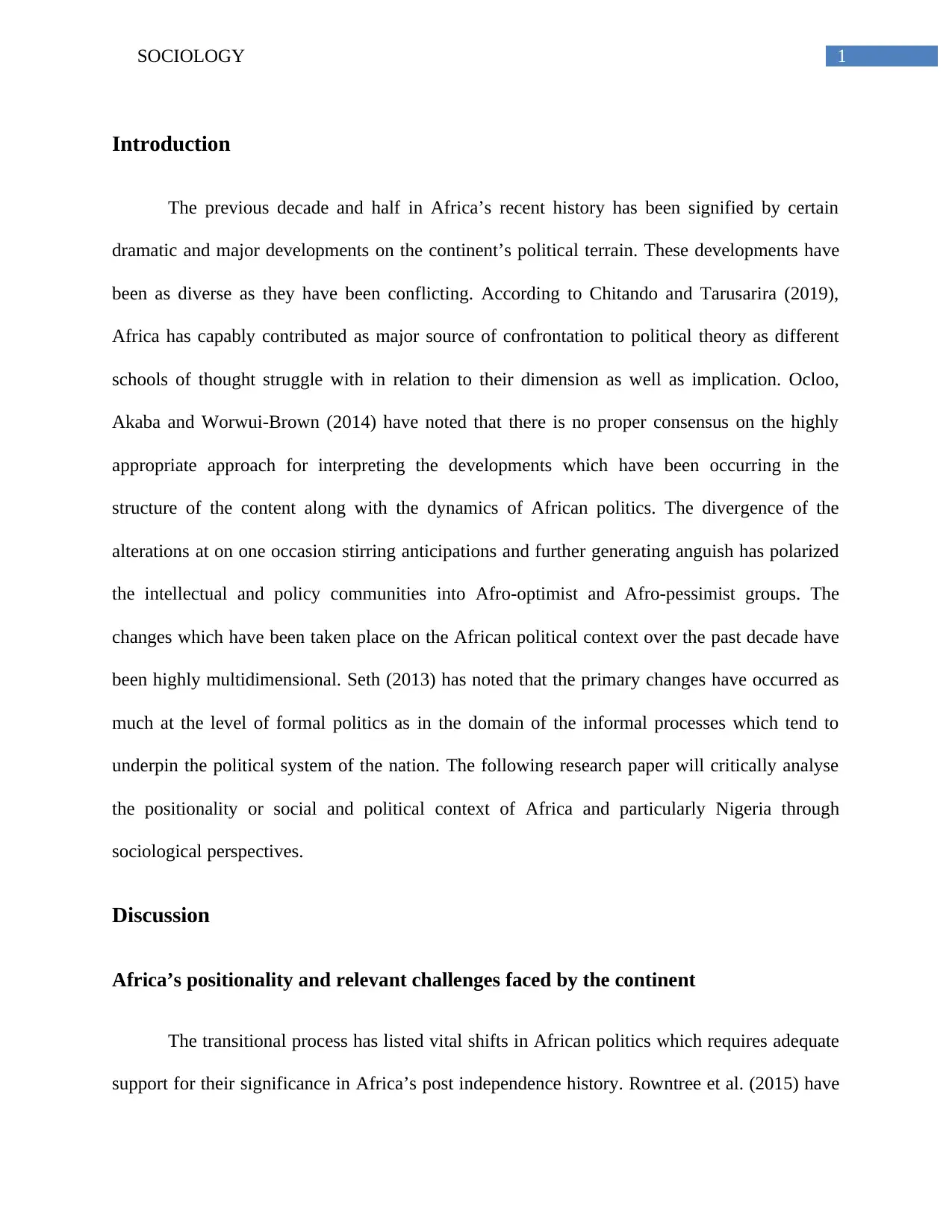
1SOCIOLOGY
Introduction
The previous decade and half in Africa’s recent history has been signified by certain
dramatic and major developments on the continent’s political terrain. These developments have
been as diverse as they have been conflicting. According to Chitando and Tarusarira (2019),
Africa has capably contributed as major source of confrontation to political theory as different
schools of thought struggle with in relation to their dimension as well as implication. Ocloo,
Akaba and Worwui-Brown (2014) have noted that there is no proper consensus on the highly
appropriate approach for interpreting the developments which have been occurring in the
structure of the content along with the dynamics of African politics. The divergence of the
alterations at on one occasion stirring anticipations and further generating anguish has polarized
the intellectual and policy communities into Afro-optimist and Afro-pessimist groups. The
changes which have been taken place on the African political context over the past decade have
been highly multidimensional. Seth (2013) has noted that the primary changes have occurred as
much at the level of formal politics as in the domain of the informal processes which tend to
underpin the political system of the nation. The following research paper will critically analyse
the positionality or social and political context of Africa and particularly Nigeria through
sociological perspectives.
Discussion
Africa’s positionality and relevant challenges faced by the continent
The transitional process has listed vital shifts in African politics which requires adequate
support for their significance in Africa’s post independence history. Rowntree et al. (2015) have
Introduction
The previous decade and half in Africa’s recent history has been signified by certain
dramatic and major developments on the continent’s political terrain. These developments have
been as diverse as they have been conflicting. According to Chitando and Tarusarira (2019),
Africa has capably contributed as major source of confrontation to political theory as different
schools of thought struggle with in relation to their dimension as well as implication. Ocloo,
Akaba and Worwui-Brown (2014) have noted that there is no proper consensus on the highly
appropriate approach for interpreting the developments which have been occurring in the
structure of the content along with the dynamics of African politics. The divergence of the
alterations at on one occasion stirring anticipations and further generating anguish has polarized
the intellectual and policy communities into Afro-optimist and Afro-pessimist groups. The
changes which have been taken place on the African political context over the past decade have
been highly multidimensional. Seth (2013) has noted that the primary changes have occurred as
much at the level of formal politics as in the domain of the informal processes which tend to
underpin the political system of the nation. The following research paper will critically analyse
the positionality or social and political context of Africa and particularly Nigeria through
sociological perspectives.
Discussion
Africa’s positionality and relevant challenges faced by the continent
The transitional process has listed vital shifts in African politics which requires adequate
support for their significance in Africa’s post independence history. Rowntree et al. (2015) have
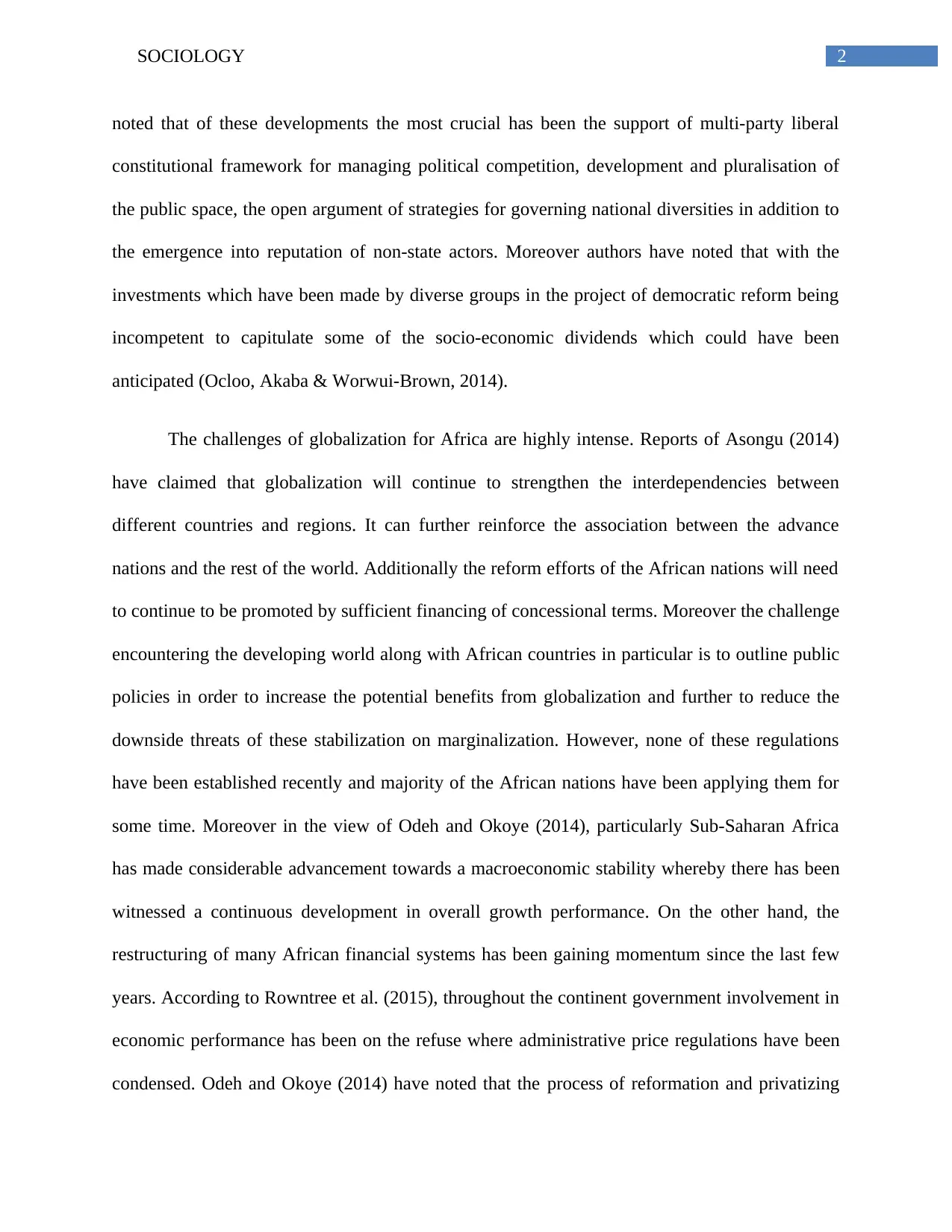
2SOCIOLOGY
noted that of these developments the most crucial has been the support of multi-party liberal
constitutional framework for managing political competition, development and pluralisation of
the public space, the open argument of strategies for governing national diversities in addition to
the emergence into reputation of non-state actors. Moreover authors have noted that with the
investments which have been made by diverse groups in the project of democratic reform being
incompetent to capitulate some of the socio-economic dividends which could have been
anticipated (Ocloo, Akaba & Worwui-Brown, 2014).
The challenges of globalization for Africa are highly intense. Reports of Asongu (2014)
have claimed that globalization will continue to strengthen the interdependencies between
different countries and regions. It can further reinforce the association between the advance
nations and the rest of the world. Additionally the reform efforts of the African nations will need
to continue to be promoted by sufficient financing of concessional terms. Moreover the challenge
encountering the developing world along with African countries in particular is to outline public
policies in order to increase the potential benefits from globalization and further to reduce the
downside threats of these stabilization on marginalization. However, none of these regulations
have been established recently and majority of the African nations have been applying them for
some time. Moreover in the view of Odeh and Okoye (2014), particularly Sub-Saharan Africa
has made considerable advancement towards a macroeconomic stability whereby there has been
witnessed a continuous development in overall growth performance. On the other hand, the
restructuring of many African financial systems has been gaining momentum since the last few
years. According to Rowntree et al. (2015), throughout the continent government involvement in
economic performance has been on the refuse where administrative price regulations have been
condensed. Odeh and Okoye (2014) have noted that the process of reformation and privatizing
noted that of these developments the most crucial has been the support of multi-party liberal
constitutional framework for managing political competition, development and pluralisation of
the public space, the open argument of strategies for governing national diversities in addition to
the emergence into reputation of non-state actors. Moreover authors have noted that with the
investments which have been made by diverse groups in the project of democratic reform being
incompetent to capitulate some of the socio-economic dividends which could have been
anticipated (Ocloo, Akaba & Worwui-Brown, 2014).
The challenges of globalization for Africa are highly intense. Reports of Asongu (2014)
have claimed that globalization will continue to strengthen the interdependencies between
different countries and regions. It can further reinforce the association between the advance
nations and the rest of the world. Additionally the reform efforts of the African nations will need
to continue to be promoted by sufficient financing of concessional terms. Moreover the challenge
encountering the developing world along with African countries in particular is to outline public
policies in order to increase the potential benefits from globalization and further to reduce the
downside threats of these stabilization on marginalization. However, none of these regulations
have been established recently and majority of the African nations have been applying them for
some time. Moreover in the view of Odeh and Okoye (2014), particularly Sub-Saharan Africa
has made considerable advancement towards a macroeconomic stability whereby there has been
witnessed a continuous development in overall growth performance. On the other hand, the
restructuring of many African financial systems has been gaining momentum since the last few
years. According to Rowntree et al. (2015), throughout the continent government involvement in
economic performance has been on the refuse where administrative price regulations have been
condensed. Odeh and Okoye (2014) have noted that the process of reformation and privatizing
⊘ This is a preview!⊘
Do you want full access?
Subscribe today to unlock all pages.

Trusted by 1+ million students worldwide
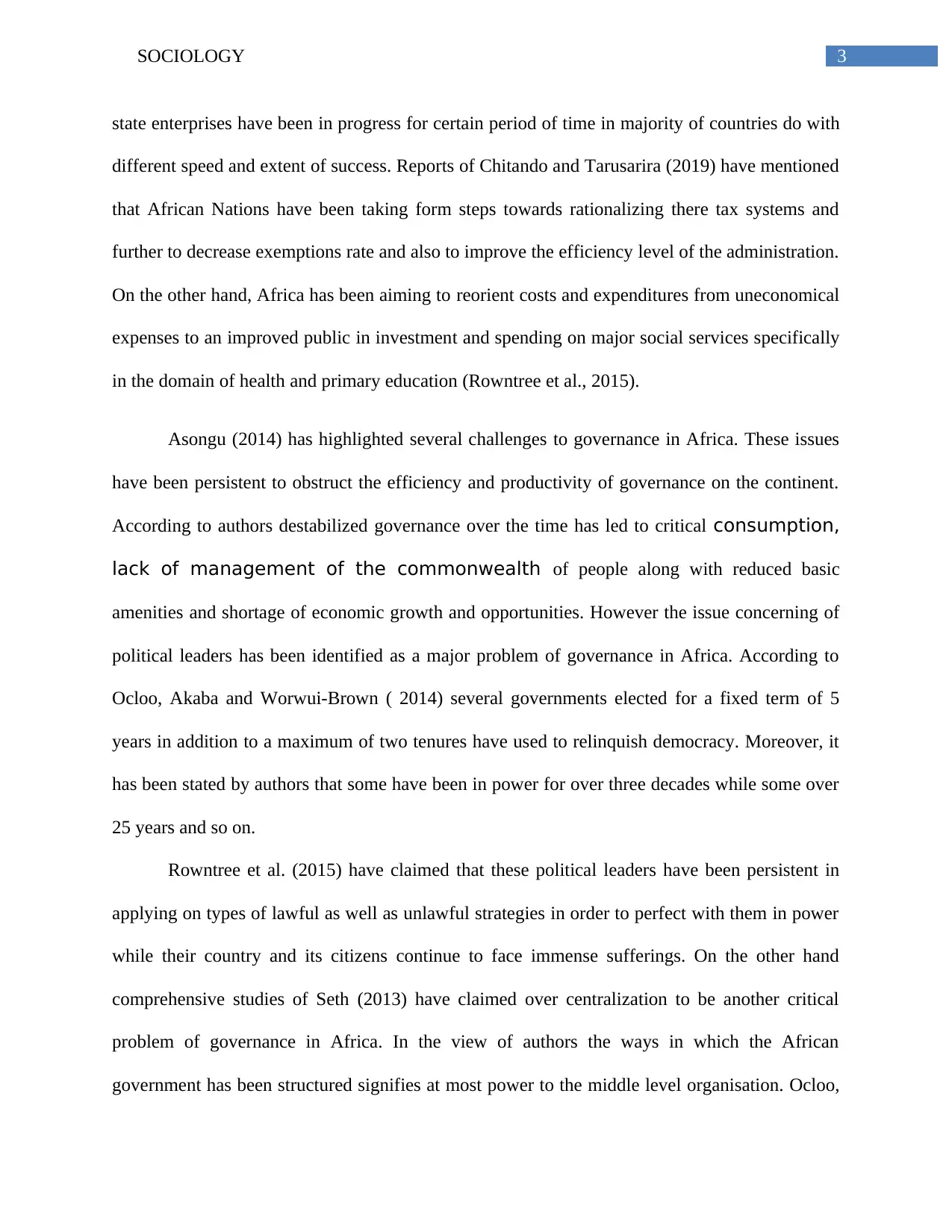
3SOCIOLOGY
state enterprises have been in progress for certain period of time in majority of countries do with
different speed and extent of success. Reports of Chitando and Tarusarira (2019) have mentioned
that African Nations have been taking form steps towards rationalizing there tax systems and
further to decrease exemptions rate and also to improve the efficiency level of the administration.
On the other hand, Africa has been aiming to reorient costs and expenditures from uneconomical
expenses to an improved public in investment and spending on major social services specifically
in the domain of health and primary education (Rowntree et al., 2015).
Asongu (2014) has highlighted several challenges to governance in Africa. These issues
have been persistent to obstruct the efficiency and productivity of governance on the continent.
According to authors destabilized governance over the time has led to critical consumption,
lack of management of the commonwealth of people along with reduced basic
amenities and shortage of economic growth and opportunities. However the issue concerning of
political leaders has been identified as a major problem of governance in Africa. According to
Ocloo, Akaba and Worwui-Brown ( 2014) several governments elected for a fixed term of 5
years in addition to a maximum of two tenures have used to relinquish democracy. Moreover, it
has been stated by authors that some have been in power for over three decades while some over
25 years and so on.
Rowntree et al. (2015) have claimed that these political leaders have been persistent in
applying on types of lawful as well as unlawful strategies in order to perfect with them in power
while their country and its citizens continue to face immense sufferings. On the other hand
comprehensive studies of Seth (2013) have claimed over centralization to be another critical
problem of governance in Africa. In the view of authors the ways in which the African
government has been structured signifies at most power to the middle level organisation. Ocloo,
state enterprises have been in progress for certain period of time in majority of countries do with
different speed and extent of success. Reports of Chitando and Tarusarira (2019) have mentioned
that African Nations have been taking form steps towards rationalizing there tax systems and
further to decrease exemptions rate and also to improve the efficiency level of the administration.
On the other hand, Africa has been aiming to reorient costs and expenditures from uneconomical
expenses to an improved public in investment and spending on major social services specifically
in the domain of health and primary education (Rowntree et al., 2015).
Asongu (2014) has highlighted several challenges to governance in Africa. These issues
have been persistent to obstruct the efficiency and productivity of governance on the continent.
According to authors destabilized governance over the time has led to critical consumption,
lack of management of the commonwealth of people along with reduced basic
amenities and shortage of economic growth and opportunities. However the issue concerning of
political leaders has been identified as a major problem of governance in Africa. According to
Ocloo, Akaba and Worwui-Brown ( 2014) several governments elected for a fixed term of 5
years in addition to a maximum of two tenures have used to relinquish democracy. Moreover, it
has been stated by authors that some have been in power for over three decades while some over
25 years and so on.
Rowntree et al. (2015) have claimed that these political leaders have been persistent in
applying on types of lawful as well as unlawful strategies in order to perfect with them in power
while their country and its citizens continue to face immense sufferings. On the other hand
comprehensive studies of Seth (2013) have claimed over centralization to be another critical
problem of governance in Africa. In the view of authors the ways in which the African
government has been structured signifies at most power to the middle level organisation. Ocloo,
Paraphrase This Document
Need a fresh take? Get an instant paraphrase of this document with our AI Paraphraser
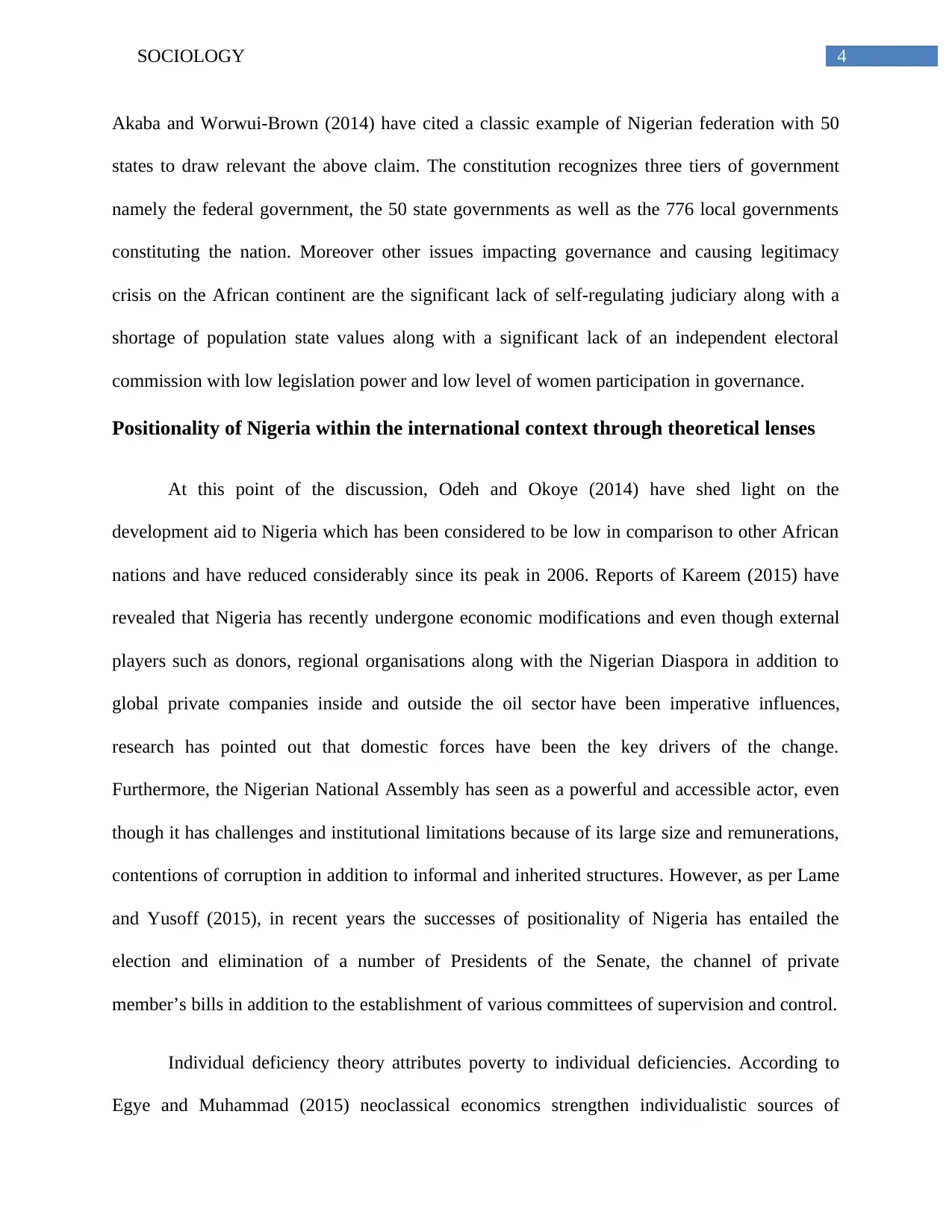
4SOCIOLOGY
Akaba and Worwui-Brown (2014) have cited a classic example of Nigerian federation with 50
states to draw relevant the above claim. The constitution recognizes three tiers of government
namely the federal government, the 50 state governments as well as the 776 local governments
constituting the nation. Moreover other issues impacting governance and causing legitimacy
crisis on the African continent are the significant lack of self-regulating judiciary along with a
shortage of population state values along with a significant lack of an independent electoral
commission with low legislation power and low level of women participation in governance.
Positionality of Nigeria within the international context through theoretical lenses
At this point of the discussion, Odeh and Okoye (2014) have shed light on the
development aid to Nigeria which has been considered to be low in comparison to other African
nations and have reduced considerably since its peak in 2006. Reports of Kareem (2015) have
revealed that Nigeria has recently undergone economic modifications and even though external
players such as donors, regional organisations along with the Nigerian Diaspora in addition to
global private companies inside and outside the oil sector have been imperative influences,
research has pointed out that domestic forces have been the key drivers of the change.
Furthermore, the Nigerian National Assembly has seen as a powerful and accessible actor, even
though it has challenges and institutional limitations because of its large size and remunerations,
contentions of corruption in addition to informal and inherited structures. However, as per Lame
and Yusoff (2015), in recent years the successes of positionality of Nigeria has entailed the
election and elimination of a number of Presidents of the Senate, the channel of private
member’s bills in addition to the establishment of various committees of supervision and control.
Individual deficiency theory attributes poverty to individual deficiencies. According to
Egye and Muhammad (2015) neoclassical economics strengthen individualistic sources of
Akaba and Worwui-Brown (2014) have cited a classic example of Nigerian federation with 50
states to draw relevant the above claim. The constitution recognizes three tiers of government
namely the federal government, the 50 state governments as well as the 776 local governments
constituting the nation. Moreover other issues impacting governance and causing legitimacy
crisis on the African continent are the significant lack of self-regulating judiciary along with a
shortage of population state values along with a significant lack of an independent electoral
commission with low legislation power and low level of women participation in governance.
Positionality of Nigeria within the international context through theoretical lenses
At this point of the discussion, Odeh and Okoye (2014) have shed light on the
development aid to Nigeria which has been considered to be low in comparison to other African
nations and have reduced considerably since its peak in 2006. Reports of Kareem (2015) have
revealed that Nigeria has recently undergone economic modifications and even though external
players such as donors, regional organisations along with the Nigerian Diaspora in addition to
global private companies inside and outside the oil sector have been imperative influences,
research has pointed out that domestic forces have been the key drivers of the change.
Furthermore, the Nigerian National Assembly has seen as a powerful and accessible actor, even
though it has challenges and institutional limitations because of its large size and remunerations,
contentions of corruption in addition to informal and inherited structures. However, as per Lame
and Yusoff (2015), in recent years the successes of positionality of Nigeria has entailed the
election and elimination of a number of Presidents of the Senate, the channel of private
member’s bills in addition to the establishment of various committees of supervision and control.
Individual deficiency theory attributes poverty to individual deficiencies. According to
Egye and Muhammad (2015) neoclassical economics strengthen individualistic sources of
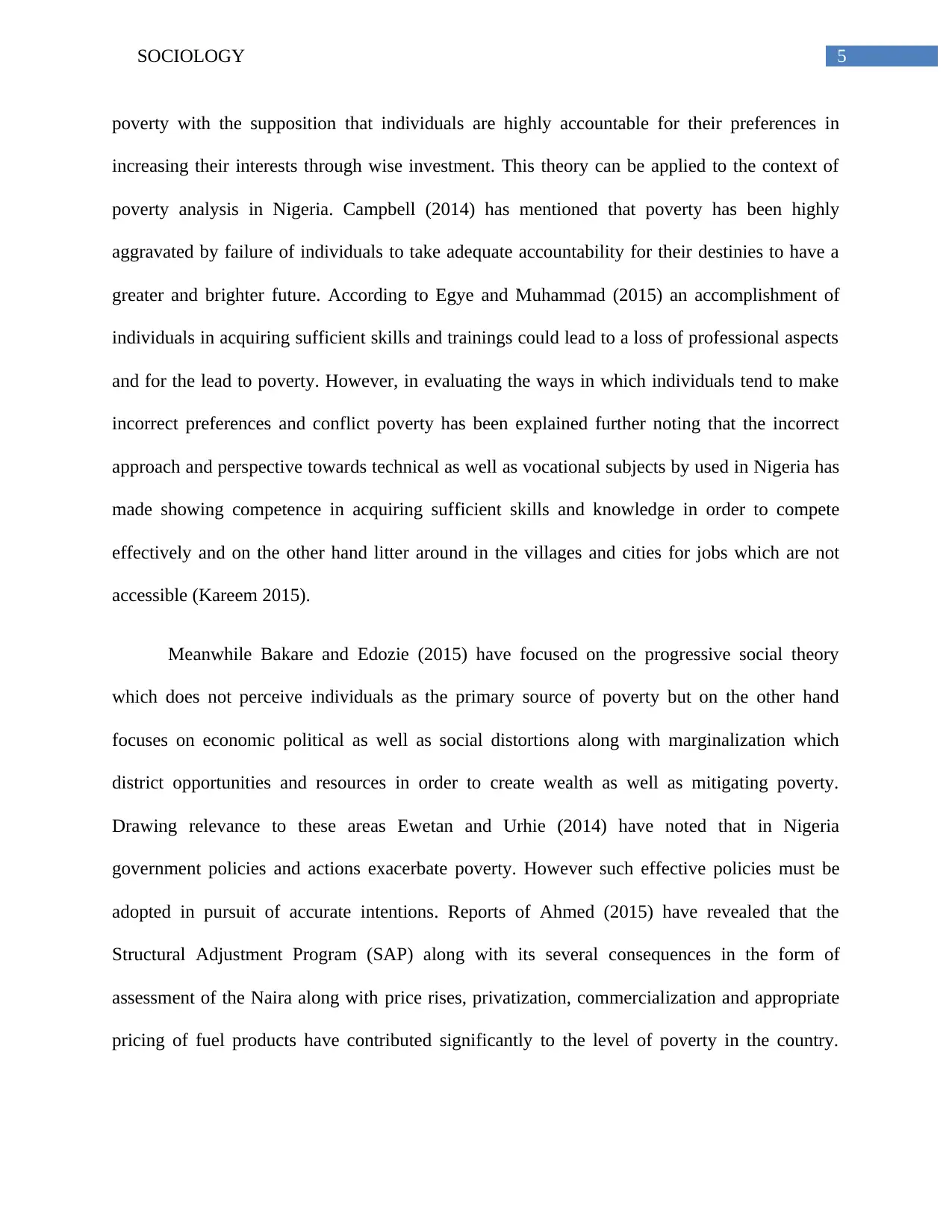
5SOCIOLOGY
poverty with the supposition that individuals are highly accountable for their preferences in
increasing their interests through wise investment. This theory can be applied to the context of
poverty analysis in Nigeria. Campbell (2014) has mentioned that poverty has been highly
aggravated by failure of individuals to take adequate accountability for their destinies to have a
greater and brighter future. According to Egye and Muhammad (2015) an accomplishment of
individuals in acquiring sufficient skills and trainings could lead to a loss of professional aspects
and for the lead to poverty. However, in evaluating the ways in which individuals tend to make
incorrect preferences and conflict poverty has been explained further noting that the incorrect
approach and perspective towards technical as well as vocational subjects by used in Nigeria has
made showing competence in acquiring sufficient skills and knowledge in order to compete
effectively and on the other hand litter around in the villages and cities for jobs which are not
accessible (Kareem 2015).
Meanwhile Bakare and Edozie (2015) have focused on the progressive social theory
which does not perceive individuals as the primary source of poverty but on the other hand
focuses on economic political as well as social distortions along with marginalization which
district opportunities and resources in order to create wealth as well as mitigating poverty.
Drawing relevance to these areas Ewetan and Urhie (2014) have noted that in Nigeria
government policies and actions exacerbate poverty. However such effective policies must be
adopted in pursuit of accurate intentions. Reports of Ahmed (2015) have revealed that the
Structural Adjustment Program (SAP) along with its several consequences in the form of
assessment of the Naira along with price rises, privatization, commercialization and appropriate
pricing of fuel products have contributed significantly to the level of poverty in the country.
poverty with the supposition that individuals are highly accountable for their preferences in
increasing their interests through wise investment. This theory can be applied to the context of
poverty analysis in Nigeria. Campbell (2014) has mentioned that poverty has been highly
aggravated by failure of individuals to take adequate accountability for their destinies to have a
greater and brighter future. According to Egye and Muhammad (2015) an accomplishment of
individuals in acquiring sufficient skills and trainings could lead to a loss of professional aspects
and for the lead to poverty. However, in evaluating the ways in which individuals tend to make
incorrect preferences and conflict poverty has been explained further noting that the incorrect
approach and perspective towards technical as well as vocational subjects by used in Nigeria has
made showing competence in acquiring sufficient skills and knowledge in order to compete
effectively and on the other hand litter around in the villages and cities for jobs which are not
accessible (Kareem 2015).
Meanwhile Bakare and Edozie (2015) have focused on the progressive social theory
which does not perceive individuals as the primary source of poverty but on the other hand
focuses on economic political as well as social distortions along with marginalization which
district opportunities and resources in order to create wealth as well as mitigating poverty.
Drawing relevance to these areas Ewetan and Urhie (2014) have noted that in Nigeria
government policies and actions exacerbate poverty. However such effective policies must be
adopted in pursuit of accurate intentions. Reports of Ahmed (2015) have revealed that the
Structural Adjustment Program (SAP) along with its several consequences in the form of
assessment of the Naira along with price rises, privatization, commercialization and appropriate
pricing of fuel products have contributed significantly to the level of poverty in the country.
⊘ This is a preview!⊘
Do you want full access?
Subscribe today to unlock all pages.

Trusted by 1+ million students worldwide
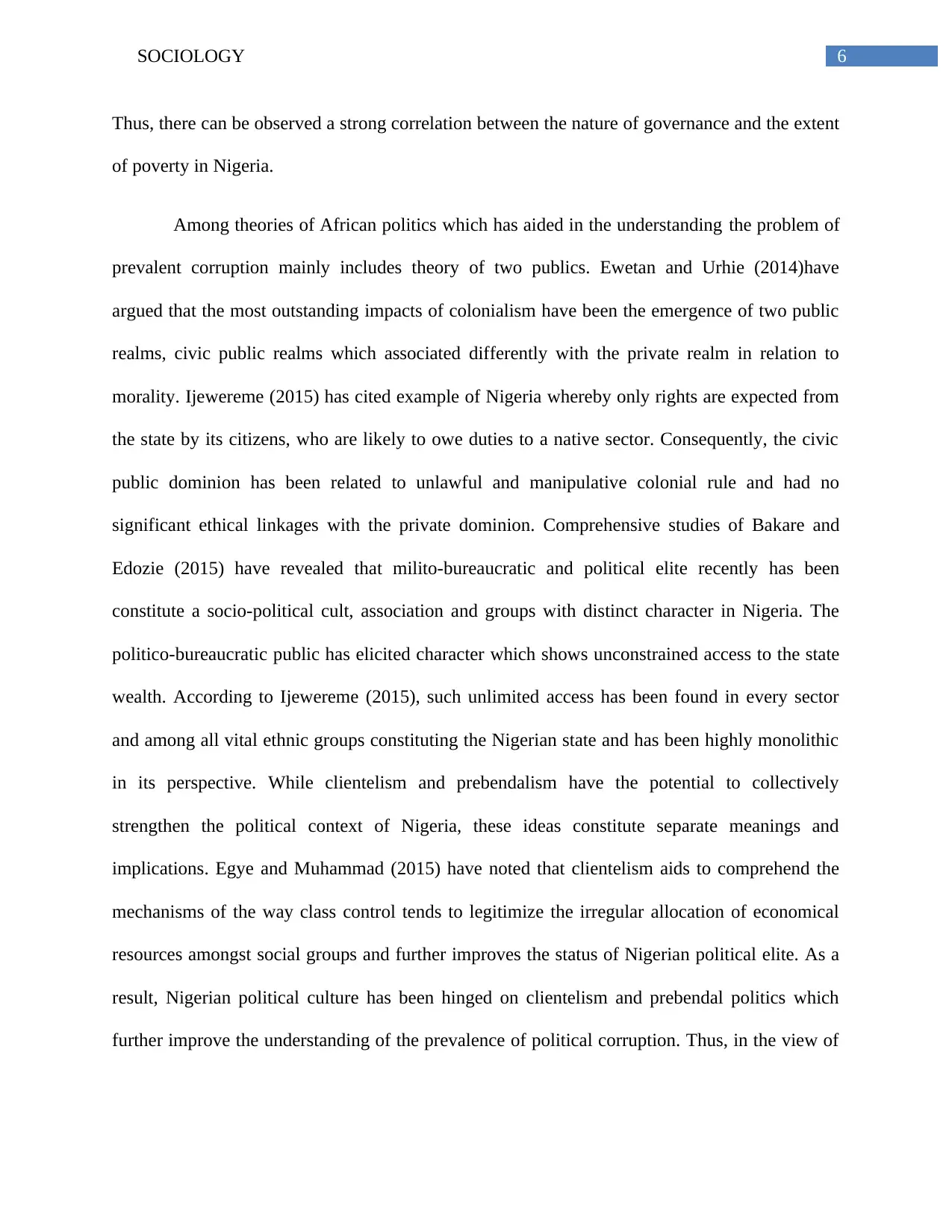
6SOCIOLOGY
Thus, there can be observed a strong correlation between the nature of governance and the extent
of poverty in Nigeria.
Among theories of African politics which has aided in the understanding the problem of
prevalent corruption mainly includes theory of two publics. Ewetan and Urhie (2014)have
argued that the most outstanding impacts of colonialism have been the emergence of two public
realms, civic public realms which associated differently with the private realm in relation to
morality. Ijewereme (2015) has cited example of Nigeria whereby only rights are expected from
the state by its citizens, who are likely to owe duties to a native sector. Consequently, the civic
public dominion has been related to unlawful and manipulative colonial rule and had no
significant ethical linkages with the private dominion. Comprehensive studies of Bakare and
Edozie (2015) have revealed that milito-bureaucratic and political elite recently has been
constitute a socio-political cult, association and groups with distinct character in Nigeria. The
politico-bureaucratic public has elicited character which shows unconstrained access to the state
wealth. According to Ijewereme (2015), such unlimited access has been found in every sector
and among all vital ethnic groups constituting the Nigerian state and has been highly monolithic
in its perspective. While clientelism and prebendalism have the potential to collectively
strengthen the political context of Nigeria, these ideas constitute separate meanings and
implications. Egye and Muhammad (2015) have noted that clientelism aids to comprehend the
mechanisms of the way class control tends to legitimize the irregular allocation of economical
resources amongst social groups and further improves the status of Nigerian political elite. As a
result, Nigerian political culture has been hinged on clientelism and prebendal politics which
further improve the understanding of the prevalence of political corruption. Thus, in the view of
Thus, there can be observed a strong correlation between the nature of governance and the extent
of poverty in Nigeria.
Among theories of African politics which has aided in the understanding the problem of
prevalent corruption mainly includes theory of two publics. Ewetan and Urhie (2014)have
argued that the most outstanding impacts of colonialism have been the emergence of two public
realms, civic public realms which associated differently with the private realm in relation to
morality. Ijewereme (2015) has cited example of Nigeria whereby only rights are expected from
the state by its citizens, who are likely to owe duties to a native sector. Consequently, the civic
public dominion has been related to unlawful and manipulative colonial rule and had no
significant ethical linkages with the private dominion. Comprehensive studies of Bakare and
Edozie (2015) have revealed that milito-bureaucratic and political elite recently has been
constitute a socio-political cult, association and groups with distinct character in Nigeria. The
politico-bureaucratic public has elicited character which shows unconstrained access to the state
wealth. According to Ijewereme (2015), such unlimited access has been found in every sector
and among all vital ethnic groups constituting the Nigerian state and has been highly monolithic
in its perspective. While clientelism and prebendalism have the potential to collectively
strengthen the political context of Nigeria, these ideas constitute separate meanings and
implications. Egye and Muhammad (2015) have noted that clientelism aids to comprehend the
mechanisms of the way class control tends to legitimize the irregular allocation of economical
resources amongst social groups and further improves the status of Nigerian political elite. As a
result, Nigerian political culture has been hinged on clientelism and prebendal politics which
further improve the understanding of the prevalence of political corruption. Thus, in the view of
Paraphrase This Document
Need a fresh take? Get an instant paraphrase of this document with our AI Paraphraser
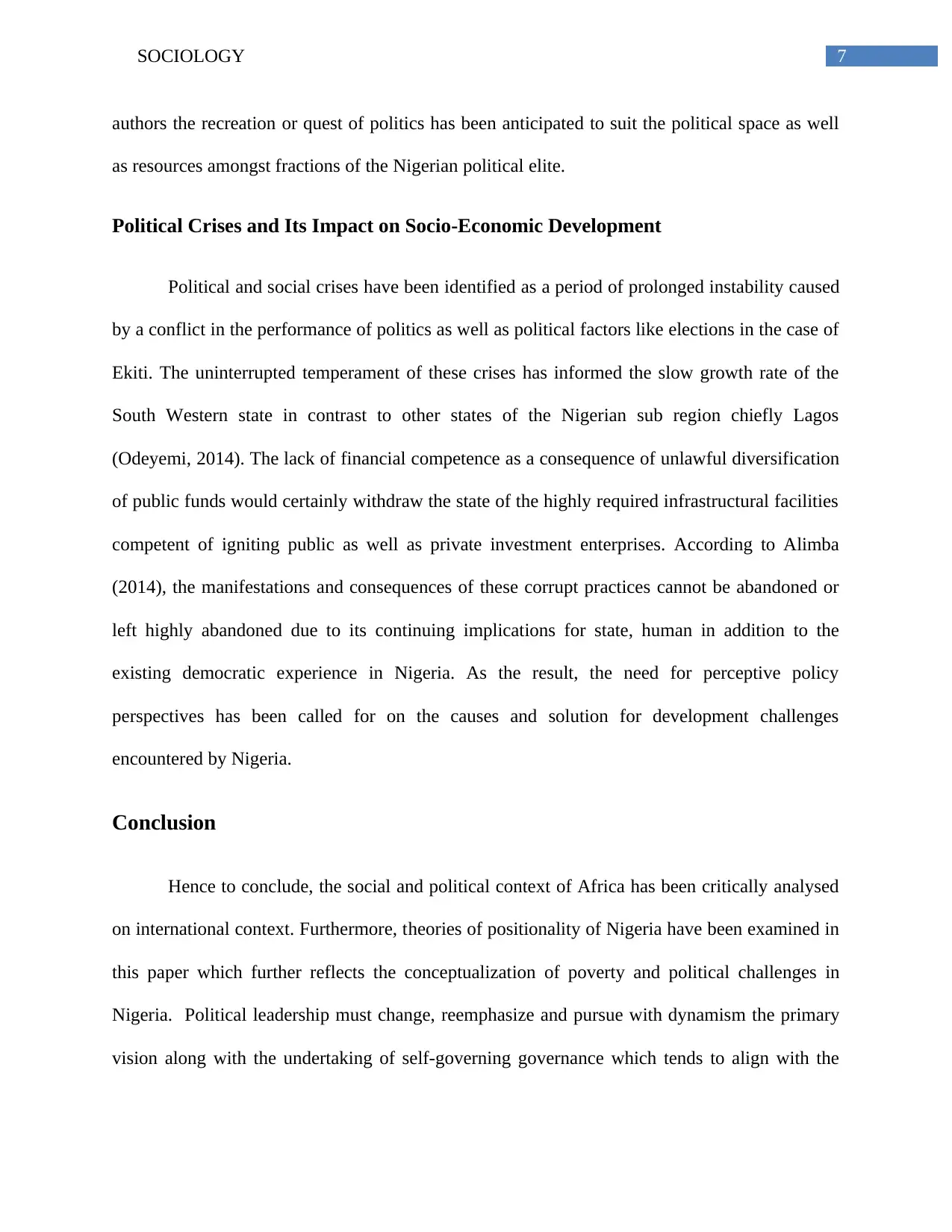
7SOCIOLOGY
authors the recreation or quest of politics has been anticipated to suit the political space as well
as resources amongst fractions of the Nigerian political elite.
Political Crises and Its Impact on Socio-Economic Development
Political and social crises have been identified as a period of prolonged instability caused
by a conflict in the performance of politics as well as political factors like elections in the case of
Ekiti. The uninterrupted temperament of these crises has informed the slow growth rate of the
South Western state in contrast to other states of the Nigerian sub region chiefly Lagos
(Odeyemi, 2014). The lack of financial competence as a consequence of unlawful diversification
of public funds would certainly withdraw the state of the highly required infrastructural facilities
competent of igniting public as well as private investment enterprises. According to Alimba
(2014), the manifestations and consequences of these corrupt practices cannot be abandoned or
left highly abandoned due to its continuing implications for state, human in addition to the
existing democratic experience in Nigeria. As the result, the need for perceptive policy
perspectives has been called for on the causes and solution for development challenges
encountered by Nigeria.
Conclusion
Hence to conclude, the social and political context of Africa has been critically analysed
on international context. Furthermore, theories of positionality of Nigeria have been examined in
this paper which further reflects the conceptualization of poverty and political challenges in
Nigeria. Political leadership must change, reemphasize and pursue with dynamism the primary
vision along with the undertaking of self-governing governance which tends to align with the
authors the recreation or quest of politics has been anticipated to suit the political space as well
as resources amongst fractions of the Nigerian political elite.
Political Crises and Its Impact on Socio-Economic Development
Political and social crises have been identified as a period of prolonged instability caused
by a conflict in the performance of politics as well as political factors like elections in the case of
Ekiti. The uninterrupted temperament of these crises has informed the slow growth rate of the
South Western state in contrast to other states of the Nigerian sub region chiefly Lagos
(Odeyemi, 2014). The lack of financial competence as a consequence of unlawful diversification
of public funds would certainly withdraw the state of the highly required infrastructural facilities
competent of igniting public as well as private investment enterprises. According to Alimba
(2014), the manifestations and consequences of these corrupt practices cannot be abandoned or
left highly abandoned due to its continuing implications for state, human in addition to the
existing democratic experience in Nigeria. As the result, the need for perceptive policy
perspectives has been called for on the causes and solution for development challenges
encountered by Nigeria.
Conclusion
Hence to conclude, the social and political context of Africa has been critically analysed
on international context. Furthermore, theories of positionality of Nigeria have been examined in
this paper which further reflects the conceptualization of poverty and political challenges in
Nigeria. Political leadership must change, reemphasize and pursue with dynamism the primary
vision along with the undertaking of self-governing governance which tends to align with the
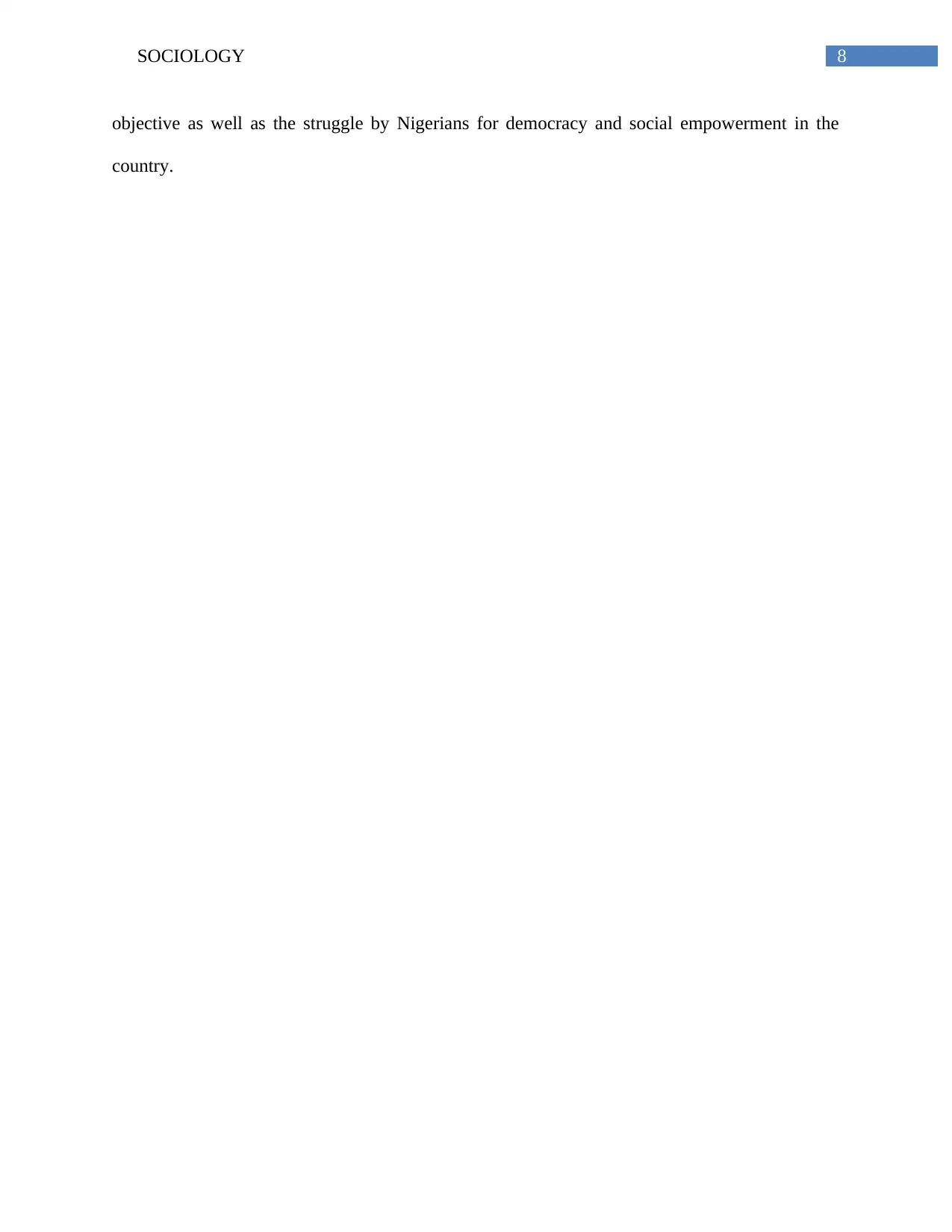
8SOCIOLOGY
objective as well as the struggle by Nigerians for democracy and social empowerment in the
country.
objective as well as the struggle by Nigerians for democracy and social empowerment in the
country.
⊘ This is a preview!⊘
Do you want full access?
Subscribe today to unlock all pages.

Trusted by 1+ million students worldwide
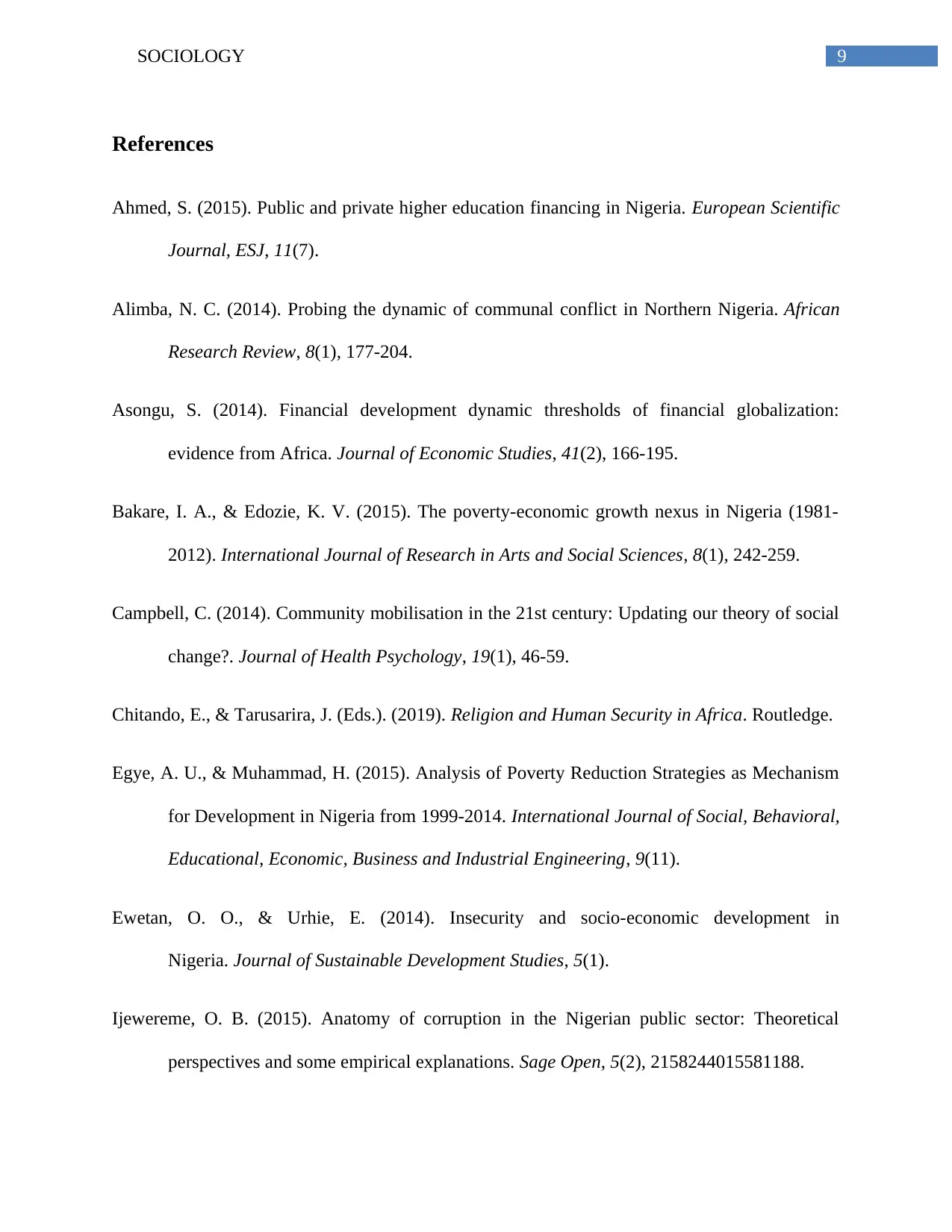
9SOCIOLOGY
References
Ahmed, S. (2015). Public and private higher education financing in Nigeria. European Scientific
Journal, ESJ, 11(7).
Alimba, N. C. (2014). Probing the dynamic of communal conflict in Northern Nigeria. African
Research Review, 8(1), 177-204.
Asongu, S. (2014). Financial development dynamic thresholds of financial globalization:
evidence from Africa. Journal of Economic Studies, 41(2), 166-195.
Bakare, I. A., & Edozie, K. V. (2015). The poverty-economic growth nexus in Nigeria (1981-
2012). International Journal of Research in Arts and Social Sciences, 8(1), 242-259.
Campbell, C. (2014). Community mobilisation in the 21st century: Updating our theory of social
change?. Journal of Health Psychology, 19(1), 46-59.
Chitando, E., & Tarusarira, J. (Eds.). (2019). Religion and Human Security in Africa. Routledge.
Egye, A. U., & Muhammad, H. (2015). Analysis of Poverty Reduction Strategies as Mechanism
for Development in Nigeria from 1999-2014. International Journal of Social, Behavioral,
Educational, Economic, Business and Industrial Engineering, 9(11).
Ewetan, O. O., & Urhie, E. (2014). Insecurity and socio-economic development in
Nigeria. Journal of Sustainable Development Studies, 5(1).
Ijewereme, O. B. (2015). Anatomy of corruption in the Nigerian public sector: Theoretical
perspectives and some empirical explanations. Sage Open, 5(2), 2158244015581188.
References
Ahmed, S. (2015). Public and private higher education financing in Nigeria. European Scientific
Journal, ESJ, 11(7).
Alimba, N. C. (2014). Probing the dynamic of communal conflict in Northern Nigeria. African
Research Review, 8(1), 177-204.
Asongu, S. (2014). Financial development dynamic thresholds of financial globalization:
evidence from Africa. Journal of Economic Studies, 41(2), 166-195.
Bakare, I. A., & Edozie, K. V. (2015). The poverty-economic growth nexus in Nigeria (1981-
2012). International Journal of Research in Arts and Social Sciences, 8(1), 242-259.
Campbell, C. (2014). Community mobilisation in the 21st century: Updating our theory of social
change?. Journal of Health Psychology, 19(1), 46-59.
Chitando, E., & Tarusarira, J. (Eds.). (2019). Religion and Human Security in Africa. Routledge.
Egye, A. U., & Muhammad, H. (2015). Analysis of Poverty Reduction Strategies as Mechanism
for Development in Nigeria from 1999-2014. International Journal of Social, Behavioral,
Educational, Economic, Business and Industrial Engineering, 9(11).
Ewetan, O. O., & Urhie, E. (2014). Insecurity and socio-economic development in
Nigeria. Journal of Sustainable Development Studies, 5(1).
Ijewereme, O. B. (2015). Anatomy of corruption in the Nigerian public sector: Theoretical
perspectives and some empirical explanations. Sage Open, 5(2), 2158244015581188.
Paraphrase This Document
Need a fresh take? Get an instant paraphrase of this document with our AI Paraphraser
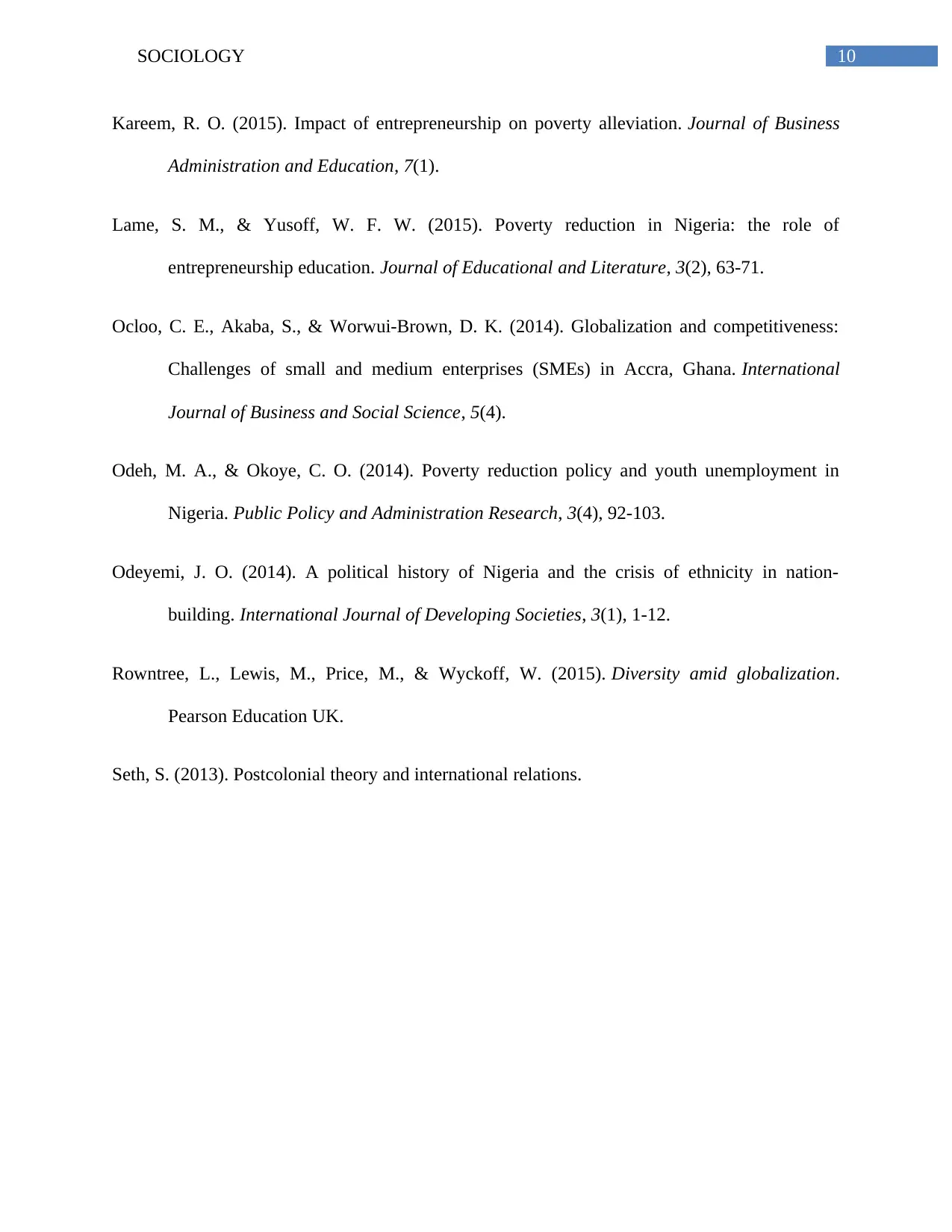
10SOCIOLOGY
Kareem, R. O. (2015). Impact of entrepreneurship on poverty alleviation. Journal of Business
Administration and Education, 7(1).
Lame, S. M., & Yusoff, W. F. W. (2015). Poverty reduction in Nigeria: the role of
entrepreneurship education. Journal of Educational and Literature, 3(2), 63-71.
Ocloo, C. E., Akaba, S., & Worwui-Brown, D. K. (2014). Globalization and competitiveness:
Challenges of small and medium enterprises (SMEs) in Accra, Ghana. International
Journal of Business and Social Science, 5(4).
Odeh, M. A., & Okoye, C. O. (2014). Poverty reduction policy and youth unemployment in
Nigeria. Public Policy and Administration Research, 3(4), 92-103.
Odeyemi, J. O. (2014). A political history of Nigeria and the crisis of ethnicity in nation-
building. International Journal of Developing Societies, 3(1), 1-12.
Rowntree, L., Lewis, M., Price, M., & Wyckoff, W. (2015). Diversity amid globalization.
Pearson Education UK.
Seth, S. (2013). Postcolonial theory and international relations.
Kareem, R. O. (2015). Impact of entrepreneurship on poverty alleviation. Journal of Business
Administration and Education, 7(1).
Lame, S. M., & Yusoff, W. F. W. (2015). Poverty reduction in Nigeria: the role of
entrepreneurship education. Journal of Educational and Literature, 3(2), 63-71.
Ocloo, C. E., Akaba, S., & Worwui-Brown, D. K. (2014). Globalization and competitiveness:
Challenges of small and medium enterprises (SMEs) in Accra, Ghana. International
Journal of Business and Social Science, 5(4).
Odeh, M. A., & Okoye, C. O. (2014). Poverty reduction policy and youth unemployment in
Nigeria. Public Policy and Administration Research, 3(4), 92-103.
Odeyemi, J. O. (2014). A political history of Nigeria and the crisis of ethnicity in nation-
building. International Journal of Developing Societies, 3(1), 1-12.
Rowntree, L., Lewis, M., Price, M., & Wyckoff, W. (2015). Diversity amid globalization.
Pearson Education UK.
Seth, S. (2013). Postcolonial theory and international relations.
1 out of 11
Related Documents
Your All-in-One AI-Powered Toolkit for Academic Success.
+13062052269
info@desklib.com
Available 24*7 on WhatsApp / Email
![[object Object]](/_next/static/media/star-bottom.7253800d.svg)
Unlock your academic potential
Copyright © 2020–2026 A2Z Services. All Rights Reserved. Developed and managed by ZUCOL.





